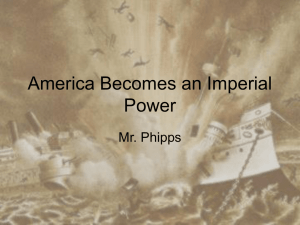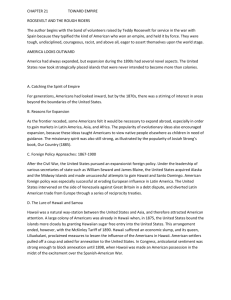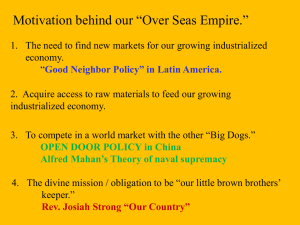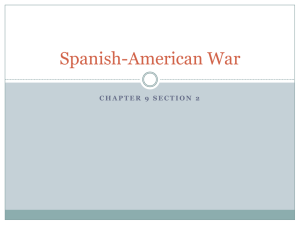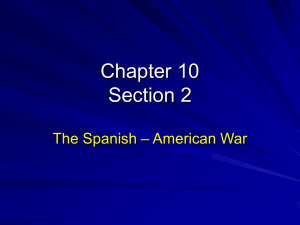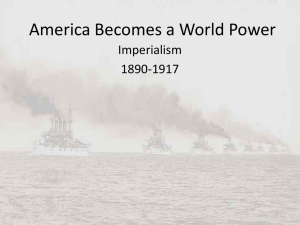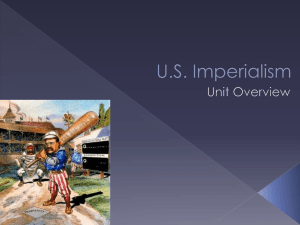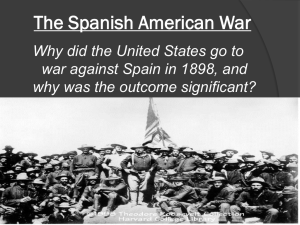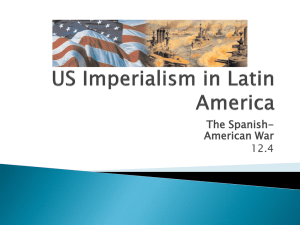chap 27
advertisement
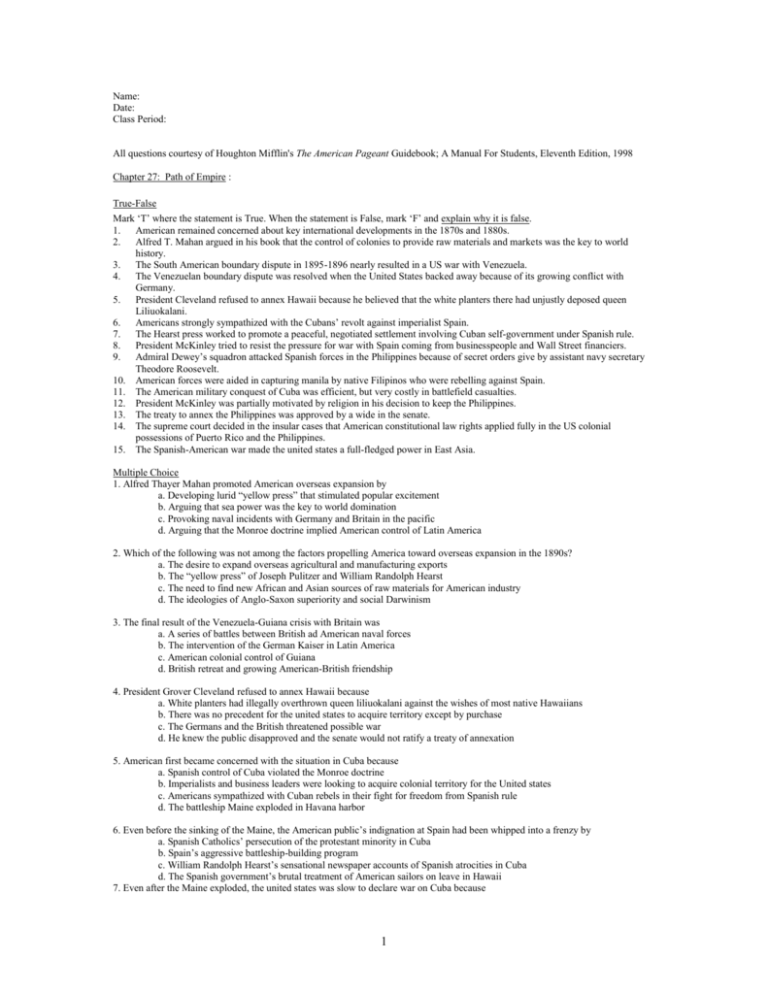
Name: Date: Class Period: All questions courtesy of Houghton Mifflin's The American Pageant Guidebook; A Manual For Students, Eleventh Edition, 1998 Chapter 27: Path of Empire : True-False Mark ‘T’ where the statement is True. When the statement is False, mark ‘F’ and explain why it is false. 1. American remained concerned about key international developments in the 1870s and 1880s. 2. Alfred T. Mahan argued in his book that the control of colonies to provide raw materials and markets was the key to world history. 3. The South American boundary dispute in 1895-1896 nearly resulted in a US war with Venezuela. 4. The Venezuelan boundary dispute was resolved when the United States backed away because of its growing conflict with Germany. 5. President Cleveland refused to annex Hawaii because he believed that the white planters there had unjustly deposed queen Liliuokalani. 6. Americans strongly sympathized with the Cubans’ revolt against imperialist Spain. 7. The Hearst press worked to promote a peaceful, negotiated settlement involving Cuban self-government under Spanish rule. 8. President McKinley tried to resist the pressure for war with Spain coming from businesspeople and Wall Street financiers. 9. Admiral Dewey’s squadron attacked Spanish forces in the Philippines because of secret orders give by assistant navy secretary Theodore Roosevelt. 10. American forces were aided in capturing manila by native Filipinos who were rebelling against Spain. 11. The American military conquest of Cuba was efficient, but very costly in battlefield casualties. 12. President McKinley was partially motivated by religion in his decision to keep the Philippines. 13. The treaty to annex the Philippines was approved by a wide in the senate. 14. The supreme court decided in the insular cases that American constitutional law rights applied fully in the US colonial possessions of Puerto Rico and the Philippines. 15. The Spanish-American war made the united states a full-fledged power in East Asia. Multiple Choice 1. Alfred Thayer Mahan promoted American overseas expansion by a. Developing lurid “yellow press” that stimulated popular excitement b. Arguing that sea power was the key to world domination c. Provoking naval incidents with Germany and Britain in the pacific d. Arguing that the Monroe doctrine implied American control of Latin America 2. Which of the following was not among the factors propelling America toward overseas expansion in the 1890s? a. The desire to expand overseas agricultural and manufacturing exports b. The “yellow press” of Joseph Pulitzer and William Randolph Hearst c. The need to find new African and Asian sources of raw materials for American industry d. The ideologies of Anglo-Saxon superiority and social Darwinism 3. The final result of the Venezuela-Guiana crisis with Britain was a. A series of battles between British ad American naval forces b. The intervention of the German Kaiser in Latin America c. American colonial control of Guiana d. British retreat and growing American-British friendship 4. President Grover Cleveland refused to annex Hawaii because a. White planters had illegally overthrown queen liliuokalani against the wishes of most native Hawaiians b. There was no precedent for the united states to acquire territory except by purchase c. The Germans and the British threatened possible war d. He knew the public disapproved and the senate would not ratify a treaty of annexation 5. American first became concerned with the situation in Cuba because a. Spanish control of Cuba violated the Monroe doctrine b. Imperialists and business leaders were looking to acquire colonial territory for the United states c. Americans sympathized with Cuban rebels in their fight for freedom from Spanish rule d. The battleship Maine exploded in Havana harbor 6. Even before the sinking of the Maine, the American public’s indignation at Spain had been whipped into a frenzy by a. Spanish Catholics’ persecution of the protestant minority in Cuba b. Spain’s aggressive battleship-building program c. William Randolph Hearst’s sensational newspaper accounts of Spanish atrocities in Cuba d. The Spanish government’s brutal treatment of American sailors on leave in Hawaii 7. Even after the Maine exploded, the united states was slow to declare war on Cuba because 1 a. The public was reluctant to get into a war b. President McKinley was reluctant to get into a war c. The Cubans were hostile to the idea of American intervention in their affairs d. There was no clear evidence that the Spanish had really blown up the Maine 8. As soon as the US declared war on Spain, commodore George Dewey sailed to the Philippine islands because a. That was the best place to strike a blow for a free Cuba b. He had been ordered to do so by assistant navy secretary Theodore Roosevelt c. The American navy happened to be on a tour of east Asian ports d. He was invited to do so by Philippine nationalists 9. Emilio Aguinaldo was a. The leader of Cuban insurgents against Spanish rule b. The leader of Filipino insurgents against Spanish rule c. The commander of the Spanish navy in the battle of manila bay d. The commander of the Spanish navy in Cuba 10. The largest cause of American deaths in Cuba was a. The direct-charge tactics of Theodore Roosevelt’s rough riders b. The effective artillery bombardments of the Spanish navy c. Armed clashes with Cuban rebels and civilians d. Bad food, disease, and unsanitary conditions 11. In addition to Cuba, American forces successfully seized the Spanish-owned Caribbean colony of a. Puerto Rico b. The virgin islands c. The Dominican republic d. Trinidad 12. President William McKinley based decision to make the Philippines an American colony on a. The belief in white Anglo-Saxon superiority to the Asian Filipinos b. A combination of religious piety and material economic interests c. The belief that Philippines would be the first step toward an American empire in china d. The strong agitation for empire coming from the hearts and Pulitzer yellow press 13. Among prominent Americans who opposed annexation of the Philippines were a. Leonard wood and Walter reed b. William Randolph Hearst and Theodore Roosevelt c. Mark twain and William James d. Mark Hanna and “czar” Thomas reed 14. Pro-imperialist Americans argued that the Philippines should be seized because of a. Patriotism and economic opportunities b. The Monroe doctrine and national security c. The declaration of independence and the wishes of the Philippine people d. Overpopulation and the need acquire new land for American settlers 15. The Platt amendment provided that a. The people of Puerto Rico were citizens of the united states b. The united states would eventually grant independence to the Philippines and Puerto Rico c. No European power could establish new bases or colonies in the pacific d. The united states had the right to intervene with troops and maintain military bases in Cuba Putting Things in Order Place the events in chronological order by numbering from them from 1 to 5 and listing their corresponding dates. American rebels in Hawaii seek annexation by the united states, but the American president turns them down A battleship explosion arouses fury in America and leads the nation into a “splendid little war” with Spain A south American boundary dispute leads to aggressive American assertion of the Monroe doctrine against Britain Americans grant Cuba self-government but retain naval bases and the right to intervene The US senate narrowly approve a treaty giving united states a major colony off the coast of Asia 2 Identification 1. Book written by a protestant minister that proclaimed the superiority of Anglo-Saxon civilization. 2. Remote pacific site of a naval clash between the united states and Germany in 1889. 3. South American nation that nearly came to blows with the united states in 1892 over an incident involving the deaths of American sailors. 4. The principle of American foreign policy invoked by secretary of state Olney to justify American intervention in the Venezuelan boundary dispute. 5. Valuable naval base acquired by the united states from the Hawaiian government in 1887. 6. Term for the sensationalistic and jingoistic pro-war journalism practice by W.R. hearts and Joseph Pulitzer. 7. American battleship sent on a “friendly” visit to Cuba that ended in disaster and war. 8. Amendment to the declaration of war with Spain that stated the united states would grant Cubans their freedom. 9. Site of the dramatic American naval victory that led to US acquisition of rich, Spanish-owned pacific islands. 10. Colorful volunteer regiment of the Spanish-American war led by a militarily inexperienced but politically influential colonel. 11. The Caribbean island conquered from Spain in 1998 that became an important American colony. 12. Group that battled against American colonization of the Philippines, which included such influential citizens as mark twain and Andrew Carnegie. 13. Supreme court cases of 1901 that determined that US constitution did not apply in all territories under the American flag. 14. American-imposed restriction written into the constitution of Cuba that guaranteed American naval bases on the island and declared that the United States had the right to intervene in Cuba 15. Deadly tropical disease conquered during the Spanish-American war by Dr. Walter Reed and other American medical researchers. Matching 1. 2. 3. 4. 5. 6. 7. 8. 9. 10. 11. 12. 13. 14. Josiah Strong Alfred Thayer Mahan Richard Olney Queen Liliuokalani Grover Cleveland “Butcher” Weyler William r. Hearst William McKinley George e. Dewey Theodore Roosevelt Emilio Aguinaldo Leonard wood William James William Jennings Bryan 15. Walter Reed A. B. C. D. E. F. G. H. I. J. K. L. M. N. O. Imperialist advocate, aggressive assistant navy secretary, rough rider Harvard philosopher and one of the leading anti-imperialists opposing US acquisition of the Philippines Spanish general whose brutal tactics against Cuban rebels outraged American public opinion Native Hawaiian ruler overthrown in a revolution led by white planters and aided by US troops Military commander of the rough riders in Cuba, who later organized the efficient American military government of Cuba American naval officer who wrote influential books emphasizing sea power and advocating a big navy Naval commander whose spectacular May Day victory in 1898 opened the doors to American imperialism in Asia Vigorous promoter of sensationalistic anti-Spanish propaganda and eager advocate of war American doctor who led the medical efforts to conquer yellow fever during US occupation of Cuba American clergyman who preached Anglo-Saxon superiority and called for a stronger US missionary effort overseas Belligerent US secretary of state who used the Monroe doctrine to pressure Britain in the Venezuelan boundary crisis President who initially opposed war with Spain but eventually supported US acquisition of the Philippines Leading democratic politician whose intervention narrowly tipped the senate vote in favor of acquiring the Philippines in 1899 American president who refused to annex Hawaii on the grounds that the native ruler had been unjustly deposed Leader of the Filipino insurgents who aided Americans in defeating Spain and taking manila 3 Cause and Effect Match the causes on the left with their effects on the right. Cause 1. Economic expansion, the yellow press, and competition with other powers 2. The Venezuelan boundary dispute 3. The white planter revolt against Queen Liliuokalani 4. The Cuban revolt against Spain 5. The Maine explosion 6. Theodore Roosevelt’s orders to Commodore Dewey 7. The confusion and weakness of Spain’s army and navy 8. McKinley’s decision to keep the Philippines 9. W. J. Bryan’s last-minute support for the treaty acquiring the Philippines 10. The Spanish-American war Effect A. Enabled American’s unprepared military forces to gain quick and easy victories B. Created an emotional and irresistible public demand for the war with Spain C. Strengthened the Monroe doctrine and made Britain more willing to accommodate US interests D. Led to the surprising US victory over Spain at manila bay E. Set off the first debate about the wisdom and rightness of American overseas imperialism F. Turned America away from isolationism and toward international involvement in the 1890s G. Aroused strong sympathy from most Americans H. Enhanced American nation pride and made the united states an international al power in east Asia I. Set off a bitter debate about imperialism in the senate and the country J. Tipped a narrow senate vote in favor of imperialist acquisition of the Philippines 4
